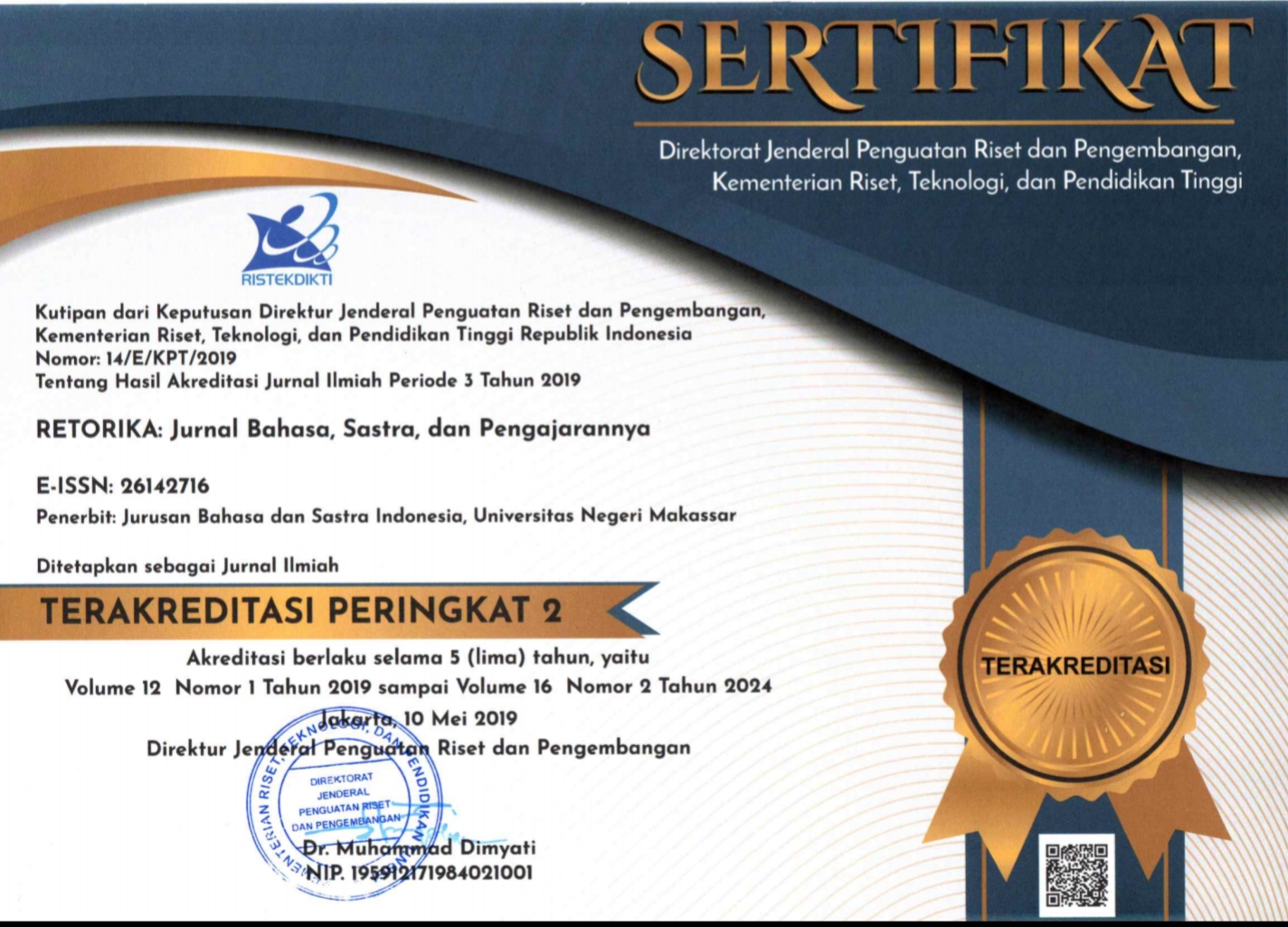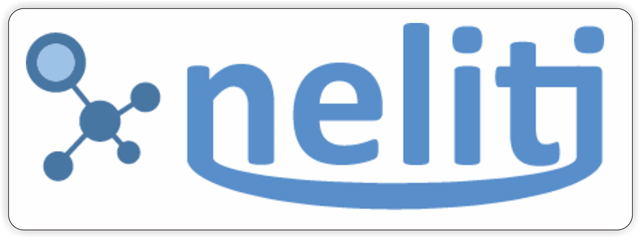THE INFLUENCE OF LEARNING STYLES ON THE LANGUAGE ABILITY OF KINDERGARTEN CHILDREN
(1) Universitas Negeri Makassar
(2) Universitas Negeri Makassar
(3) Universitas Negeri Makassar
(*) Corresponding Author
DOI: https://doi.org/10.26858/retorika.v16i2.45902
Abstract
Keywords
Full Text:
PDFReferences
Alatalo, Taja & Westlund Barbro. (2021). Preschool Teachers’ Perceptions About Read-alouds as A Means to Support Children’s Early Literacy and Language Develompement. Journal of Early Childhood Literacy Vo. 21 (3).
Anis, N., Nihazram, H. M., & Masnan, A. H. (2020). Role-play in Teaching English as Second Language in Early Childhood Education. Jurnal Pendidikan Awal Kanak-Kanak Kebangsaan, 9, 143–151.
Bedel, E. F. (2015). Assessing Locus of Control by Gender and Learning Styles in Pre-service Early Childhood Education Students. International Journal of Education and Research, 3(1), 53–62. www.ijern.com.
Dougherty, Dorothy P. (2003). Bagaimana Berbicara dengan Bayi Anda: Panduan Memaksimalkan Kecakapan Belajar dan Bahasa Anak Anda. Jakarta: Prestasi Pustaka.
Fleetham, Mike. (2006). Multiple Intelligence: In Practice Enhancing Self-Esteem and Learning In The Classroom: An Imprint of the Continuum International Publishing Group Ltd First Published.
Giancola, Marco, Palmiero & D’amico. (2022). Field Dependent-Independent Cognitive Style and Creativity from the Process and Product-Oriented Approaches: A Systematic Review. Creativity Studies, Vol. 15, Issue 2, 2022.
Husna, A., & Eliza, D. (2021). Strategi Perkembangan dan Indikator Pencapaian Bahasa Reseptif dan Bahasa Ekspresif pada Anak Usia Dini. Jurnal Family Education, 1(4), 38–46. https://doi.org/10.24036/JFE.V1I4.21.
Johnston, Judith. (2010). Factors that Influence Language Development. Encyclopedia on Early Childhood Development. University of British Columbia, Canada.
Karaçam, S., & Digilli Baran, A. (2015). The effects of field dependent/field independent cognitive styles and motivational styles on students’ conceptual understanding about direct current circuits. Asia-Pacific Forum on Science Learning and Teaching, 16(2), 1.
Kuswandi, D., & Fadhli, M. (2022). The effects of gamification method and cognitive style on children’s early reading ability. Http://Www.Editorialmanager.Com/Cogentedu, 9(1).
Nugroho, I. H., Lestariningrum, A., & Usman, J. (2021). Analysis of Motor and Cognitive Development in Early Childhood by Gender and Learning Styles Through Drawing and Coloring Activity. Jurnal Ilmiah Potensia, 6(2), 109–112. https://doi.org/10.33369/JIP.6.2.109-108.
Onyekuru, B. U. (2015). Field Dependence-Field Independence Cognitive Style, Gender, Career Choice and Academic Achievement of Secondary School Students in Emohua Local Government Area of Rivers State. Journal of Education and Practice, 6(10), 76-85.
Purnama, S., Ulfah, M., Ramadani, L., Rahmatullah, B., & Ahmad, I. F. (2022). Digital Storytelling Trends in Early Childhood Education in Indonesia: A Systematic Literature Review. JPUD - Jurnal Pendidikan Usia Dini, 16(1), 17–31. https://doi.org/10.21009/jpud.161.02.
Razmyar, Soroush & Reeve, Charlie L. (2013). Individual Differences in Religiosity as a Function of Cognitive Abiliy and Cognitive Style. Journal Intelligence, Vol. 41, Issue 5, 2013.
Rogers, Sue & Evans, Julie. (2009). Inside Role Play in Early Childhood Education: Researching Young Children’s Perspectives. American Journal of Play. New York: Routledge, 152 pp. ISBN: 9780415404976.
Saida, N. (2018). Bahasa Sebagai Salah Satu Sistem Kognitif Anak Usia Dini. Repository.Um-Surabaya.Ac.IdN SaidaBahasa Sebagai Salah Satu Sistem Kognitif Anak Usia Dini, 2018•repository.Um-Surabaya.Ac.Id. Retrieved September 18, 2023, from https://repository.um-surabaya.ac.id/id/eprint/2984.
Wahyuningtyas, A. (2022). The Comparison Between Field-Dependent and Field-Independent Students in Reanging Comprehension Achievement at The First Grade of SMAN 3 Kotabumi. Skripsi. Universitas Lampusg.
Willingham, D. T., Hughes, E. M., & Dobolyi, D. G. (2015). The Scientific Status of Learning Styles Theories. Teaching of Psychology, 42(3), 266-271.
Yusuf, Y., & Sukestiyarno, Y. (2022). Pre-service Teachers’ Statistical Reasoning based on Cognitive Style. Jurnal Didaktik Matematika, 9(1), 136–150. https://doi.org/10.24815/JDM.V9I1.24538.
Article Metrics
Abstract view : 209 times | PDF view : 87 timesRefbacks
- There are currently no refbacks.
Copyright (c) 2023 Azizah Amal, Andi Sriwahyuni Asti, Siti Nurhidayah Ilyas

This work is licensed under a Creative Commons Attribution-NonCommercial 4.0 International License.
Published by:
Department of Indonesian Language, Faculty of Languages and Literature, Universitas Negeri Makassar in cooperate with Asosiasi Dosen Bahasa dan Sastra Indonesia (ADOBSI) and Ikatan Program Studi Pendidikan Bahasa dan Sastra Indonesia (IKAPROBSI).
Address: Department of Indonesian Language Office, DG Building Second Floor, UNM Parangtambung, Daeng Tata Raya Street, Makassar, South Sulawesi, Indonesia
 Email: [email protected]
Email: [email protected]

RETORIKA: Jurnal Bahasa, Sastra,dan Pengajarannya is licensed under a Creative Commons Attribution-NonCommercial 4.0 International License.
















